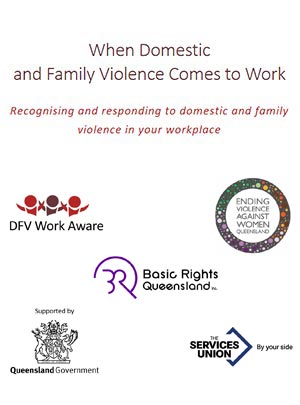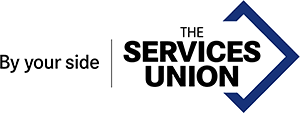DFV Resources for Employees and Employers
‘The information was presented in a focused manner and I really liked all the amazing resources provided. I will be going through these to add to my referral bank.’
Social worker, community legal centre
DFV Work Aware has developed DFV Resources that can assist your workplace, including information for employees who may be experiencing DFV or using DFV, and a safety planning tool.
DFV Workplace Rights, Entitlements and Obligations
Employees have the right to request leave and flexible work arrangements in relation to DFV. DFV Work Aware has created a quick guide here for workers and employers.
Additionally, the Fair Work Ombudsman provides an Employer Guide to Family and Domestic Violence with comprehensive information about leave and flexible work arrangements.
DFV Resources
Under the National Employment Standards, all employees (including part-time and casual employees) are entitled to 5 days unpaid family and domestic violence leave each year.
You can find more information about this here. DFV leave provisions may be found in other documents such as modern awards and enterprise agreements.
Under the Fair Work Act 2009, employees (other than a casual employee) who have worked with the same employer for at least 12 months can request flexible working arrangements if they are:
- Experiencing domestic violence; or
- Providing care or support to a member of their household or immediate family who requires care and support because of domestic and family violence.
Flexible work arrangements might include changes to hours of work, patterns of work or locations of work. The Fair Work Ombudsman provides a template letter to request a flexible work arrangement here.
Employers can find a template response to a request for flexible working arrangements here.
A modern award sets out the minimum terms and conditions, like pay and hours of work, for your industry or occupation.
These are standards in addition to the National Employment Standards.
Many Modern Awards include DFV leave clauses. To find out if your industry or occupation award includes DFV clauses, click here.
An Enterprise Agreement is an agreement between workers, their representatives, and their employer. It includes terms such as a dispute settlement procedure and information about how the employer will consult with workers.
Enterprise bargaining – the process of negotiating the agreement – is an opportunity to include leading preventative and responsive DFV terms in your Enterprise Agreement. Many workplaces have used this opportunity to include terms to help workers affected by DFV, like paid DFV leave.
The Services Union and the Australian Council of Trade Unions provide model DFV clauses for inclusion in Enterprise Agreements.
DFV is a workplace issue. This makes it a workplace risk, and employers have a responsibility under your state or territory’s work health and safety legislation to manage risks in the workplace – including DFV.
When taking a risk management approach, employers also have a responsibility not to discriminate or take adverse action against the person experiencing violence.
Safe Work Australia provides a step-by-step guide to managing risks in Australian workplaces as well as information about preventing workplace sexual harassment, violence and aggression.
Click on your state or territory to read more about how to manage DFV risks in your workplace.
DFV Policy You Can Use
Policies provide the opportunity for workplaces to put National Employment Standards, modern awards, and enterprise agreements into action in your workplace.
When your workplace has a meaningful DFV policy in place that is communicated and accessible to all workers, workers will feel safer to reach out for help at work. And, colleagues and employers will feel more confident to respond appropriately.
- Our Watch’s Workplace Equality and Respect initiative provide resources, tools and document templates for workplaces.
- The Queensland Government provides a guide, including a model policy template, to developing a DFV policy for your workplace.
- South Australia Health and Queensland Health both have comprehensive DFV workplace policies.
- For workplaces that prefer to distinguish between policy and procedure, James Cook University has shared their DFV policy and accompanying procedures.
- The Champions of Change Coalition provides a specific resource for developing a workplace policy for responding to employees who use or may use DFV.
More Resources
- Info sheet: Coercive control
- Factsheet: Leave and Flexible Work Arrangements
- Template: Individual DFV Workplace Safety Plan
The Services Union resource sheets:
- Resource 1 – Key Facts
- Resource 2 – Death Review Data
- Resource 3 – A Workplace Response to Domestic Violence
- Resource 4 – When Offering Support
- Resource 5 – Do’s and Don’ts
- Resource 6 – Stopping Abusive Calls and Contact At Work
- Resource 7 – Warning Signs at Work
- Resource 8 – DFV Workplace Rights
- Resource 9 – Aboriginal and/or Torres Strait Islander Information
- Resource 10 – Culturally and Linguistically Diverse Information
- Resource 11 – Additional Resources
- Resource 12 – When DV Comes To Work (When Work Is At Home)
- Australia’s National Research Organisation for Women’s Safety (ANROWS)
- Domestic Violence Retailer Support Hub
- eSafety Commissioner
- Fair Work Ombudsman
- Insight Exchange
- MATE Bystander
- No to Violence
- Our Watch
- Queensland Centre for Domestic and Family Violence Research (QCDFVR)
- Technology Safety Australia
- Workplace Equality and Respect
- Australia’s National Research Organisation for Women’s Safety. (2018). Violence against women: Accurate use of key statistics (ANROWS Insights 05/2018).
- Australian Institute of Health and Welfare. (2019). Family, domestic and sexual violence in Australia: Continuing the national story 2019 (Cat. no. FDV 3).
- Boxall, H., Morgan, A., & Brown, R. (2020). The prevalence of domestic violence among women during the COVID-19 pandemic (Statistical Bulletin no. 28). Australian Institute of Criminology.
- Breckenridge, J., Cale, J., Hameed, S., McCaskie, L., & Tzoumakis, S. (2015). Implementation of domestic violence clauses – an employer’s perspective. University of New South Wales, Gendered Violence Research Network.
- Campo, M., & Tayton, S. (2015). Intimate partner violence in lesbian, gay, bisexual, trans, intersex and queer communities. Key issues. Australian Institute of Family Studies.
- de Jong, A. (2018). Corporate social responsibility through a feminist lens: Domestic violence and the workplace in the 21st century. Journal of Business Ethics, 148(3), 471-487.
- Gibson, M., Kassisieh, G., Lloyd, A., & McCann, B. (2020). There’s no safe place at home: Domestic and family violence affecting LGBTIQ+ people. Equality Australia.
- Hill, J. (2019). See what you made me do: Power, control and domestic abuse. Black Inc. *Winner of the 2020 Stella Prize*
- Insight Exchange. (2020). Insights Paper. Experiences and perceptions of workplace responses to domestic and family violence. Domestic Violence Service Management.
- KPMG. (2016). The cost of violence against women and their children in Australia. Final report. Department of Social Services.
- Lee, J. (2017). Counting the cost: Addressing domestic violence in the workplace. HRD Press Inc.
- McAdams, L. (2017). Domestic violence: Changing culture, saving lives. A workplace guide for developing a culture of empathy and understanding. Lisa McAdams Pty Ltd.
- McFerran, L. (2011). Safe at home, safe at work? National domestic violence and the workplace survey (2011). University of New South Wales, Gendered Violence Research Network.
- McLindon, E., Humphreys, C., & Hegarty, K. (2018). “It happens to clinicians too”: An Australian prevalence study of intimate partner and family violence against health professionals. BMC Women’s Health, 18(1), 113- 119.
- PricewaterhouseCoopers Australia. (2015). A high price to pay: The economic case for preventing violence against women. PricewaterhouseCoopers Australia.
- Showalter, K. (2016). Women’s employment and domestic violence: A review of the literature. Aggression and Violent Behavior, 31, 37-47.
- Wathen, C.W., MacGregor, J.C.D., & MacQuarrie, B.J. (2015). The impact of domestic violence in the workplace. Results from a pan-Canadian survey. Journal of Occupational and Environmental Medicine, 57(7), e65-e71.
- Workers’ Compensation Nominal Insurer v Hill, NSWCA 54 (2020).
When you attend our training you will receive DFV Resources to take back with you to the workplace.

When DFV Comes to Work

Workplace Safety Planning Tools
‘The most helpful thing was the emphasis on the perspective that victim-survivors are already actively managing their situation.’
Union member

